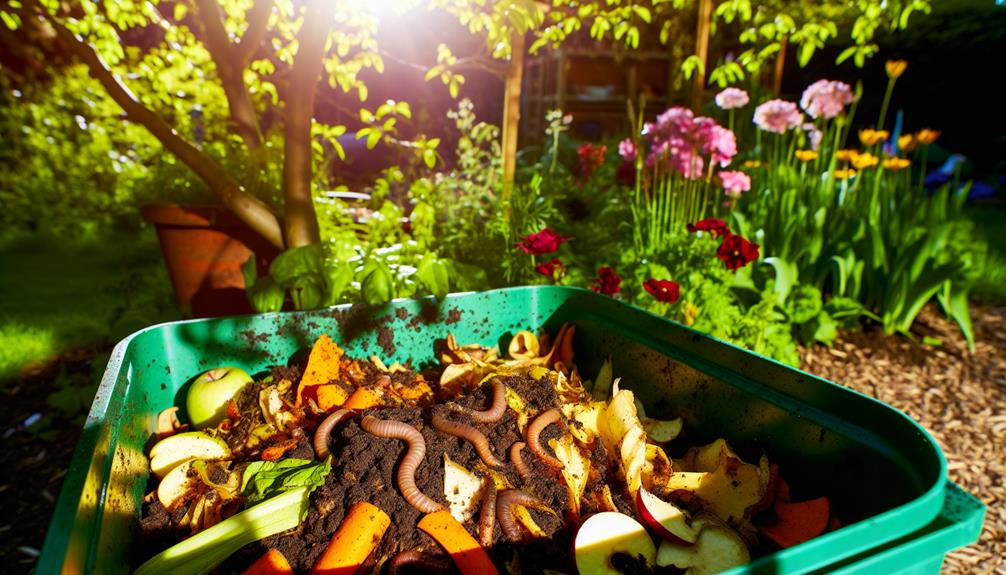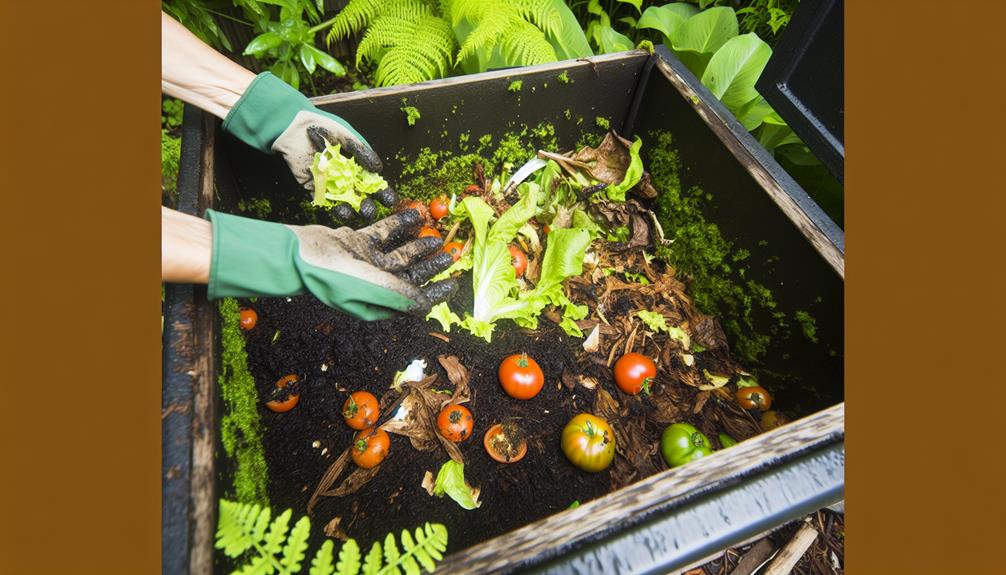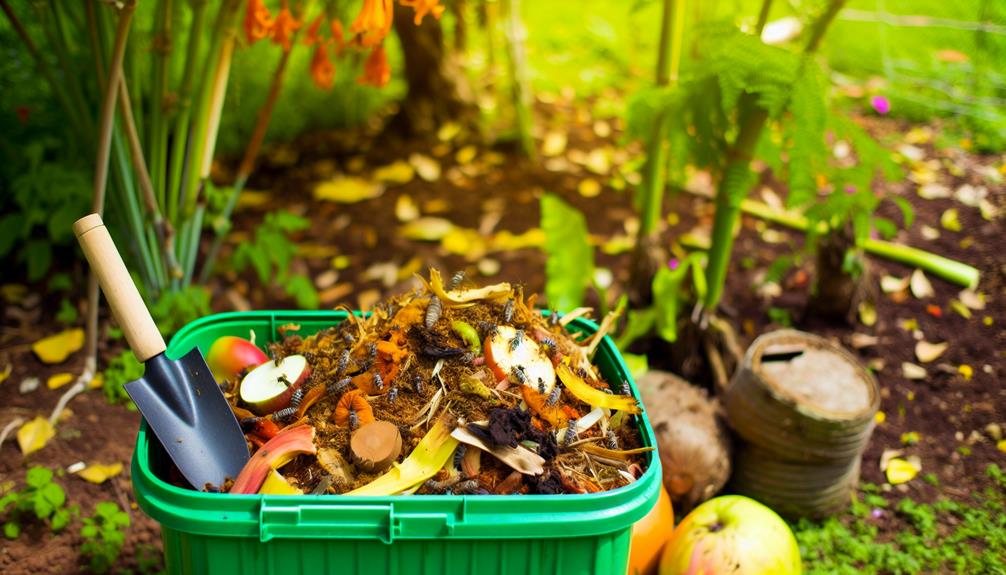

Yes, you can compost vegetables that have gone bad. Start by removing any non-compostable materials like stickers or rubber bands. Cut the vegetables into smaller pieces to speed up decomposition. Avoid composting cooked vegetables with oils or sauces.
It’s essential to balance your compost pile with green (nitrogen) and brown (carbon) materials, aiming for roughly a 3:1 ratio. Turn your pile regularly to keep it aerated and adjust moisture levels as needed. If you’re dealing with odors or pests, add more brown materials or secure your bin. Stay tuned for more tips on effective composting practices.
Composting spoiled vegetables transforms waste into nutrient-rich soil, benefiting both your garden and the environment. When you compost, you’re actively participating in nutrient recycling, an essential process that returns essential minerals and compounds back into the soil. This reduces the need for chemical fertilizers, which can harm the environment. By composting, you’re not just keeping your garden healthy; you’re also making a positive environmental impact.
Think about all the vegetables that go bad in your fridge. Instead of tossing them into the trash where they’ll end up in a landfill, you can turn them into a valuable resource for your garden. Landfills contribute to greenhouse gas emissions, but composting helps mitigate this by reducing the volume of waste that decomposes anaerobically.
Plus, the nutrient-rich compost you create will improve soil structure, enhance moisture retention, and support beneficial microbial activity.
Also Read: Can You Compost Body Wash?
Not all vegetables are suitable for composting, so it’s important to identify which ones can be effectively turned into compost. Most vegetables are compostable, but there are some key considerations.
Leafy greens, root vegetables, and soft vegetables like tomatoes and cucumbers break down well. These types of vegetables contribute rich nutrients to your compost pile, improving soil health and reducing food waste.
However, you should avoid composting vegetables that have been cooked with oils or sauces, as these can attract pests and slow down the composting process. Avoid composting diseased plants or vegetables treated with pesticides. These could introduce harmful elements into your compost, affecting its quality.
Remember, diversity in your compost pile is beneficial. Mixing different types of compostable vegetables ensures a balanced nutrient mix. While adding vegetables, chop them into smaller pieces to speed up decomposition.
Keeping a good balance between green (nitrogen-rich) and brown (carbon-rich) materials is vital. Vegetables fall into the green category, so mix them with brown materials like dry leaves or cardboard.
Also Read: Can You Compost Blood?
To prepare rotten vegetables for compost, start by removing any non-compostable materials like stickers or rubber bands. Once you’ve cleared those out, you’ll want to focus on proper cutting techniques to speed up the composting process. Chop the vegetables into smaller pieces. This increases the surface area, helping microorganisms break them down more efficiently.

Consider the storage methods you’ve used for these vegetables. If they were stored in plastic bags, discard the bags appropriately and transfer the vegetables into a compostable container. If the vegetables were in a crisper drawer, make sure they’re free of excess moisture by patting them dry. Too much moisture can slow down the composting process and cause unpleasant odors.
Next, inspect the vegetables for any signs of mold or extensive rot. While most rotten vegetables are compostable, very moldy or excessively slimy ones can throw off the balance of your compost pile. In such cases, it’s best to dispose of them separately.
Also Read: Can You Compost Bones?
Achieving a balanced compost pile means maintaining the right mix of green and brown materials. Greens, like your rotten vegetables, add nitrogen, while browns, such as dried leaves and cardboard, supply carbon. The ideal carbon nitrogen ratio for composting is around 30:1. This balance guarantees efficient decomposition and minimizes unpleasant odors.
To start, layer your greens and browns. A good rule is three parts brown to one part green. This ratio helps maintain the proper carbon nitrogen ratio and promotes compost aeration. Without adequate airflow, your compost can become compacted and start to smell.
Turning your pile regularly, roughly every one to two weeks, keeps it aerated and speeds up the composting process.
Also, consider moisture. Your compost should feel like a damp sponge. Too much water can lead to a lack of aeration, while too little will slow down decomposition. If your pile is too wet, add more browns. If it’s too dry, add greens or a bit of water.
Also Read: Can You Compost Apple Cores?
Even with the right balance of greens and browns, you might still encounter some common composting issues. One frequent problem is compost odors. If your compost pile smells bad, it’s likely too wet or lacks enough brown materials like leaves and paper. To fix this, turn your pile to aerate it and add more browns to balance the moisture.

Another tip is to monitor the size of your compost pieces; smaller pieces break down faster and more evenly.
Pest control is another concern. Unwanted critters like rodents can be attracted to your compost if it contains food scraps like meat or dairy. To keep pests at bay, stick to vegetable scraps and cover new additions with a layer of browns. You might also consider using a compost bin with a secure lid to keep animals out.
Lastly, if your compost isn’t breaking down as quickly as you’d like, it might be too dry or lack sufficient nitrogen. Sprinkling some water and adding green materials like fresh vegetable scraps can help speed up the process.
With these troubleshooting tips, you can maintain a healthy, efficient compost pile.
Yes, composting vegetables can attract pests, but you can use pest deterrents for effective garden maintenance. Join our community of gardeners who share tips on keeping your compost pest-free and your garden thriving!
You’re probably wondering about the composting duration for vegetable breakdown. It typically takes 2-6 months, depending on factors like temperature and aeration. Joining a local composting group can provide support and shared tips for best results.
You shouldn’t compost root vegetables if they’ve been treated with pesticides, or any diseased plants. Doing so can harm your compost and garden. Stick to healthy, untreated veggies to keep your compost community thriving.
Yes, you can compost vegetables with mold or fungus. Mold management is essential, so turn your compost regularly. The fungal impact helps break down organic matter, creating rich soil. You’re contributing to a thriving, eco-friendly community!
Yes, you can compost vegetables with seeds, but be cautious. Seed viability means they might sprout. If they’re non-native, you risk introducing invasive plants. Stick to seeds from your local area to keep your compost safe.
By composting spoiled vegetables, you’re not only reducing waste but enriching your garden soil. Make sure you identify compostable vegetables and properly prepare them.
Balance your compost pile with greens and browns to maintain its health. If issues arise, troubleshoot by checking moisture levels and aeration.
With these tips, you’ll turn rotten produce into valuable compost, benefiting both your garden and the environment. Remember, composting is an effective way to recycle organic matter.
